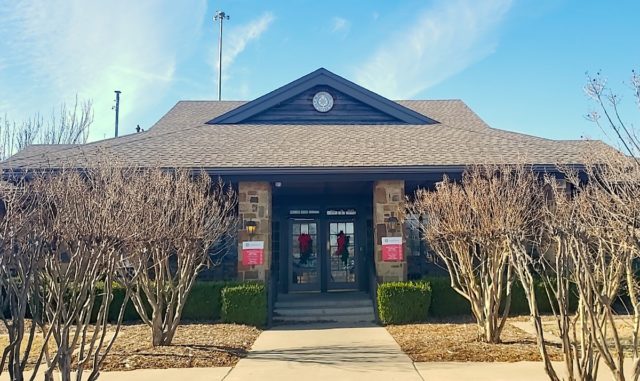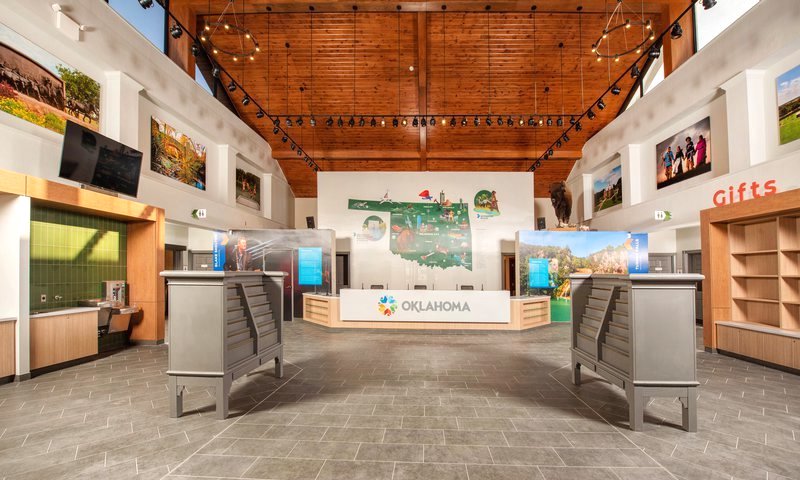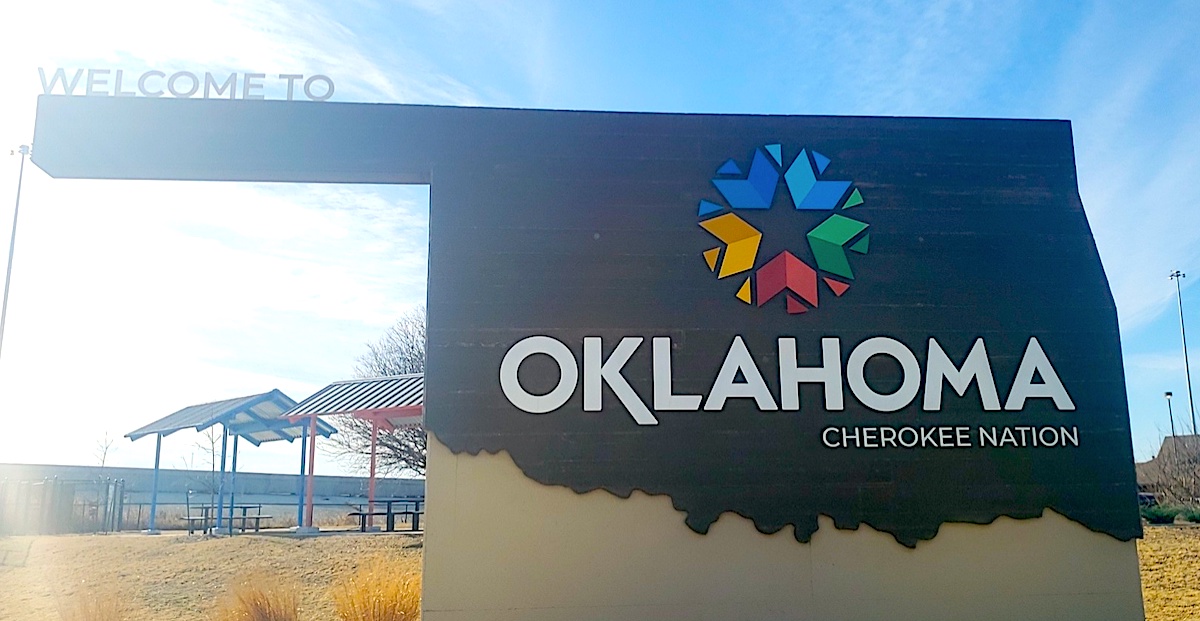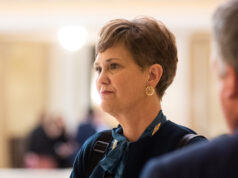

The state of Oklahoma is in the process of ending contracts that leased the operations of six travel welcome centers to municipalities and corporate subsidiaries of tribal nations between 1997 and 2017. All of the welcome centers were leased without compensation, although one contract with a Chickasaw company included reimbursement for utility costs.
Three of the contracts with tribal companies expired Dec. 31. Two were with Cherokee Nation Entertainment LLC for a pair of welcome centers it had operated for a decade in northeast Oklahoma: One near the town of Kansas along State Highway 412 since 2010, and a second near Catoosa on the same highway since 2011. (The Cherokee Nation operated a tribal tag agency out of the Catoosa welcome center.)
The third contract was with Chickasaw Country LLC, which had operated the Thackerville Information Center since 2011 until that agreement expired Dec. 31. A similar agreement from 2017 for the City of Miami to operate the Northeast Oklahoma Travel Information Center expired earlier in 2021.
Gov. Kevin Stitt and Lt. Gov. Matt Pinnell both say the Oklahoma Department of Tourism and Recreation expects to generate new revenue by reclaiming operations of the six welcome centers. The agency already operated three other centers near state borders, as well as one in north Oklahoma City and one inside the State Capitol. Those have seen more than a 100 percent increase in sales after recent renovations and reconfigurations, according to Pinnell.
Pinnell said ODTR is implementing plans to increase all of the centers’ revenues and economic impact.
“We invested heavily in renovating all of these welcome centers, and because of that one of the big positives that came out of that is we are generating a lot of revenue out of these welcome centers now,” Pinnell said. “It’s pretty impressive numbers.”
Regardless of how high t-shirt sales and cabin rentals can climb, the Stitt administration’s decision to watch more agreements with tribal nations end will be viewed by some as further tension between the first-term governor and tribal leaders, who prefer to pitch themselves as valuable partners for the state. After all, that’s one reason Cherokee, Chickasaw and Choctaw companies came to operate the welcome centers in the first place as prior state leaders looked for ways to cut costs during bad budget years.
“Under Gov. (Mary) Fallin’s administration, the Tourism and Recreation Department contacted us and asked if we would be interested in operating the center as a budget saving measure for the state,” Paige Shepherd, director of corporate development and tourism for the Chickasaw Nation, said in a statement to NonDoc. “We agreed to operate the center. We appreciate the Tourism and Recreation Department professionals with whom we have worked collaboratively and productively to welcome an average of more than 800,000 visitors per year to Oklahoma and Chickasaw Country.”
Cherokee Nation Principal Chief Chuck Hoskin Jr. said he was “disappointed at the dissolution of this partnership with the state in regard to the welcome centers, but we remain willing partners on any future opportunities that benefit both the citizens of Oklahoma and citizens of Cherokee Nation.”
Pinnell said the Stitt administration’s decision to retake operations of the welcome centers should not be seen as antagonistic toward tribal nations.
“I don’t look at it that way, because of the history here. The welcome centers were not managed by the tribes more than [a decade] ago, and there’s only a couple of them,” Pinnell said. “The long-term vision I had was, listen, these are huge opportunities for us to capture a whole lot more people that are going through the state of Oklahoma and tell them where they can spend money. We weren’t doing that, and now we are.”
Stitt ‘going to look at every single different contract’

Shepherd said Chickasaw Country LLC “invested” about $525,000 per year into the Thackerville center’s operation, which she said saved the state more than $5 million since 2011.
But the original 2011 Chickasaw contract featured components not found in the state’s other welcome center contracts, including the fact that ODTR was subleasing the property from the Oklahoma Department of Transportation. Additionally, the Chickasaw Nation Division of Commerce agreed to pay the state 5 percent of the sale of concession goods at the Thackerville center. That portion of the contract was stricken upon renegotiation in 2017, and it is not immediately clear what amount of money — if any — was paid to the state between 2011 and 2017.
The 2017 amendment also clarified language related to how the state reimbursed the tribal enterprise for electricity, water and garbage removal. (The state’s other contracts with the Cherokee company, the Choctaw company and the municipalities did not include such reimbursement.)
The 2011 Chickasaw contract spelled out the utility reimbursement details:
To the extent the state is reimbursed for the utility cost by the Oklahoma Department of Transportation (ODOT), the funds designated by state as maintenance and utilities will be “passed through” to Chickasaw Nation. For the first year, that amount is contemplated to be $300,000. All utility bills paid by [the Chickasaw Nation] shall be reimbursed within 45 days of being submitted to Oklahoma Department of Tourism.
Shepherd said the Chickasaw Nation’s $525,000 annual expense did not include the utility reimbursements.
State leaders believe the renovated welcome centers — particularly the Thackerville location on I-35 just north of the Red River — can generate more money than they will cost to operate. When Pinnell and ODTR staff took their numbers and presentation to Stitt, the governor quickly supported letting the third-party welcome center contracts expire.
“There are tons of visitors — 80,000 cars going past them,” Stitt said. “We spent about $18 million of taxpayers’ dollars redoing travel sites all over the state. So I think it’s important that we take those over and create revenue out of them.”
All 11 welcome centers — including the ones recently returned to state operation — received a combined $18.6 million in upgrades from CARES Act funding and the Department of Transportation. Beyond aesthetic and functional improvements, the state installed touch-less entry and bathroom technology.
“It was a no-brainer to do it this way versus simply allowing somebody else to take $18 million of free upgrades and allow them to sell and make money off of their products,” Stitt said. “I’m going to look at every single different contract we have in the state, and I want to maximize it for the taxpayers.”
The welcome center agreements are not the first case in which Stitt has believed his gubernatorial predecessors struck agreements with tribal leaders that did not “maximize” return for the state. He infamously attempted to renegotiate Oklahoma’s Model Tribal Gaming Compact from scratch, calling Gov. Brad Henry’s original framework “dated” in a modern gaming industry landscape.
Recently, he declined to renew the Cherokee and Choctaw nations’ hunting and fishing compacts approved by Gov. Mary Fallin. In Dec. 13 letters to Cherokee Nation Principal Chief Chuck Hoskin Jr. and Choctaw Nation Chief Gary Batton, Stitt called Fallin’s prior agreements “fundamentally inequitable” for low-income, non-tribal citizens.
Stitt appears to view the welcome center contracts in a similar manner.
“I would not be doing my job as the CEO of the state if I did not think about my shareholders — the taxpayers — and try to get the most benefit I can for them,” Stitt said.
State could reclassify or sell some welcome centers

The only welcome center contract yet to expire is for the Colbert Travel Information Center, which was leased to a company called Choctaw Professional Resources Enterprise Inc. in 2013.
At that time, Batton was the Choctaw Nation’s assistant chief, but he signed the state contract as chairman of Choctaw Professional Resources Enterprise Inc., a tribally owned business primarily focused on health care personnel, according to its website. Batton became the 47th chief of the Choctaw Nation in 2014 following the retirement of Gregory Pyle.
Randy Sachs, director of public relations for the Choctaw Nation, said tribal leaders are still reviewing the welcome center situation since their contract is not set to expire until Dec. 31, 2023.
Shepherd of the Chickasaw Nation said Chickasaw Country LLC “retroceded operation” of the Thackerville welcome center at 5 p.m. Dec. 31 as the contract with the state expired.
“We plan to continue investing time and resources into venues such as the Chickasaw Cultural Center, the Chickasaw Welcome Center and numerous other attractions sharing the diverse history of the Chickasaw Nation and Oklahoma,” she said. “We remain committed to tourism because of the significant economic, cultural, and social benefits it brings to our state.”
Pinnell agreed on that point and said the Thackerville center’s location is particularly prime for that purpose.
“Thackerville is one of the most highly trafficked welcome centers in the state,” Pinnell said. “That is one we would like to have back to be able to generate revenue on and make it self-sufficient.”
To achieve that goal, Pinnell said the state is looking at possibly reclassifying some of the welcome centers owing to certain economic restrictions under federal highway laws.
“It’s very archaic rulemaking,” Pinnell said. “At the Thackerville location, it’s hard to sell a pop. That’s why you have, like, vending machines at some of these locations. So we are looking at reclassifying some of those so that we can sell things that people getting off our highways would actually want to buy, which makes more revenue and makes these welcome centers more self-sufficient.”
Pinnell said the state may consider selling some of the smaller welcome centers, but he emphasized that tribal nations and tourism destinations will still be promoted in the state-run welcome centers.
“We absolutely will still promote Native America and, particularly Choctaw Country and Chickasaw Country where those welcome centers are,” Pinnell said. “For me it was, this is the crossroads of America. We have more people visiting our welcome centers than most any other state in the country, and I looked at them as big opportunities for us to really be promoting the state in a much more aggressive way. We’re doing that now, and because we’re doing that now, we’re generating more revenue there.”
History of contracted welcome centers
The state’s six welcome centers that had been under operational contract by other parties include:
- Midwest City Welcome Center, constructed in 1997 by state bonds and appropriations on land owned by Midwest City, with the city operating the centers until 2020;
- Cherokee Travel Information Center, leased to Cherokee Nation Entertainment LLC in 2010;
- Catoosa Travel Information Center, leased to Cherokee Nation Entertainment LLC in 2011. (In 2013, the contract was amended to transfer all office equipment, fixtures and furnishings to the company);
- Thackerville Information Center, leased to Chickasaw Country, LLC in 2011;
- Colbert Travel Information Center, leased to Choctaw Professional Resources Enterprise Inc. in 2013;
- Ottawa County Travel Information Center, leased to the City of Miami in 2017.




















